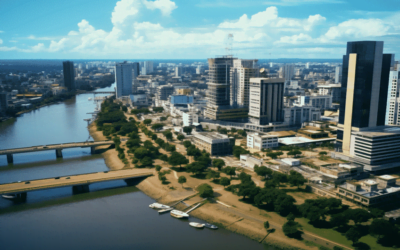Hey there, fellow drone enthusiasts and curious minds! If you’re reading this, you’ve probably got that burning question about Vanuatu’s drone laws. I get it; the world of drone regulations can be as confusing as navigating through a maze in a foreign land.
You’re wondering what you can and can’t do, what rules you need to follow, and how to enjoy your drone safely in Vanuatu. Well, you’re in the right place because I’ve been there too, and I’ve got some answers to put your mind at ease.
I’ve spent quite a bit of time digging into the ins and outs of Vanuatu’s drone laws. I know how important it is to have reliable information, and I’ve done the legwork to make sure you’re well-informed.
From special considerations for travelers bringing their drones to fascinating details on regulations for hobbyists, commercial operators, and even government drone flights, I’ve got the lowdown. So, you can trust that what you’ll find in this article isn’t just any run-of-the-mill drone data—it’s a firsthand account of what you need to know.
If you’re eager to fly in the stunning Vanuatu landscape or simply want to understand the rules governing drone use in this island paradise, then keep reading. This article is your roadmap to understanding Vanuatu’s drone laws.
Whether you’re a hobbyist, a commercial operator, or a traveler with a drone in tow, I’ve got the answers to your search intent. So, let’s dive into the captivating world of drones in Vanuatu and uncover what you need to know to take to the skies with confidence.
- Overview of Drone Regulations in Vanuatu
- Vanuatu Hobbyist Drone Operators
- Vanuatu Commercial Drone Operators
- Visitors and Tourists Flying Drones in Vanuatu
- Vanuatu Government Drone Operators
- General Drone Laws in Vanuatu
- Guidelines for Traveling with Drones to Vanuatu
- Final Thoughts on Vanuatu Drone Laws
- Frequently Asked Questions on Vanuatu Drone Law
Overview of Drone Regulations in Vanuatu

Now, let’s embark on our journey into the realm of Vanuatu’s drone regulations. The skies over these Pacific islands beckon to both beginners and experienced drone pilots, but before you take flight, understanding the rules set by the Civil Aviation Authority of Vanuatu (CAAV) is crucial.
Role of the Civil Aviation Authority of Vanuatu (CAAV)
Picture the CAAV as the guardian of Vanuatu’s airspace. This authority keeps a watchful eye to ensure the safety and harmony of drone operations across the islands.
Just like a traffic cop on a bustling street, they establish the rules, oversee compliance, and make sure the drone show in Vanuatu runs smoothly. In this tropical paradise, the CAAV is your go-to source for all things drone-related.
Categories of Drone Operators in Vanuatu
Now, let’s talk about the cast of characters in this aerial adventure. Vanuatu’s drone community is made up of four main groups: hobbyists, commercial operators, visitors, and government players.
Each group has its role to play, and Vanuatu’s drone laws ensure that everyone can enjoy the skies while safeguarding the interests of this unique island nation.
Distinction Between Recreational and Commercial Drone Rules
Imagine you’re at a beach with two different kinds of surfboards. There’s the recreational board for leisurely paddling, and then there’s the pro board for those catching killer waves. Vanuatu’s drone rules work in a similar way, distinguishing between recreational and commercial operations.
This distinction ensures that hobbyists can fly their drones for fun, while commercial operators have clear guidelines to follow for business purposes. It’s all about creating an environment where everyone can experience the joy of drone flight, whether it’s for play or profit.
Also Read: Uzbekistan Drone Laws 2024
Vanuatu Hobbyist Drone Operators

Alright, let’s dive into the world of hobbyist drone operators in Vanuatu. These are the folks who are in it for the sheer joy of flying drones, capturing stunning views, and exploring the skies. If you’re one of them, you’ll want to know the rules that apply, and I’m here to break them down for you.
Regulations Specific to Hobbyist Drone Operators
Think of hobbyist drone operators as the adventurers of the drone community. You’ve got your drone, and you’re eager to explore the picturesque landscapes of Vanuatu. The good news is, you’re free to take flight.
But, just like any adventure, there are some guidelines to follow. You’ll need to fly only during daylight, keep your drone within your line of sight, and be sure not to fly higher than 120 meters (about 393 feet) above ground level. It’s all about enjoying the freedom to explore while ensuring safety in the skies.
No Requirement for a Vanuatu Drone Pilot License
Here’s the kicker for hobbyists – you don’t need a drone pilot license in Vanuatu. That means you can take your drone out for a spin without having to go through the licensing process. It’s like being handed the keys to a rental car—as long as you follow the rules of the road, you’re good to go.
Drone Registration and Fees
Just like paying a small entrance fee to a national park, hobbyist drone operators in Vanuatu need to register their drones with the Civil Aviation Authority.
It’s a simple process that involves a small fee, and it ensures that your drone is on the radar (not literally, of course). After completing the registration, you’ll have access to a list of no-fly zones, helping you steer clear of restricted areas.
Importance of Drone Insurance for Hobbyists
Imagine you’re on a scenic drive through the mountains, and you know your car is covered by insurance in case of unexpected mishaps. Similarly, for hobbyist drone operators, having drone insurance is a smart move.
While it’s not a requirement, it provides that extra layer of security. Accidents can happen, and having insurance can save the day if your drone takes an unexpected nosedive or encounters unforeseen issues.
It’s like having a safety net while you explore the skies and capture breathtaking moments with your drone.
Also Read: Uruguay Drone Laws 2024
Vanuatu Commercial Drone Operators

Commercial drone operators, this one’s for you. Whether you’re a seasoned pro or just starting your journey into the world of drone-based businesses, understanding the rules and regulations for commercial drone operations in Vanuatu is crucial. Let’s get into the nitty-gritty.
Regulations Specific to Commercial Drone Operators
It’s like opening a new restaurant in town – there are certain health and safety regulations you’ve got to follow. For commercial drone operators, it’s no different. While you’re free to conduct business using drones, you’ll need to adhere to some specific rules.
This includes flying during daylight hours, ensuring your drone doesn’t fly higher than 120 meters above ground level, and maintaining a direct line of sight with your drone at all times. These rules keep everyone safe and ensure that business can take off without a hitch.
No Requirement for a Vanuatu Drone Pilot License
Here’s a welcome surprise for commercial operators – you won’t need a drone pilot license in Vanuatu either. Just like hobbyists, you can take flight without the added paperwork. It simplifies the process and lets you focus on your business without the extra hassle.
Drone Registration and Fees
Think of drone registration as the cost of setting up a shop. Commercial drone operators in Vanuatu must register their drones with the Civil Aviation Authority. It involves a small fee, but it’s all part of the process.
Once registered, you’ll have access to valuable information about restricted areas, ensuring you can plan your operations with confidence.
Emphasis on Responsible Drone Operation for Commercial Purposes
Running a commercial drone operation is a bit like running a delivery service. You want your packages to reach their destination safely. Similarly, for commercial drone operators, responsible operation is paramount.
Vanuatu’s regulations emphasize the need to minimize hazards, yield to crewed aircraft, and seek consent before flying over people and property. It’s all about delivering your services while ensuring the safety and well-being of those below.
Also Read: United States Drone Laws 2024
Visitors and Tourists Flying Drones in Vanuatu

Picture this: You’re a traveler with a drone in your backpack, excited to capture the beauty of Vanuatu from above.
Well, Vanuatu welcomes you with open skies. Whether you’re a tourist or a visitor, here’s what you need to know about flying drones in this stunning island nation.
Regulations for Foreign Visitors Using Drones in Vanuatu
Just like every country, Vanuatu has rules in place for visitors bringing their drones. But don’t worry, it’s not as complex as deciphering a foreign language.
As a foreign visitor, you’re allowed to fly your drone in Vanuatu, provided you abide by the country’s regulations.
This means flying during daylight, avoiding restricted areas, and respecting the safety of people and property. It’s all about ensuring that your drone adventure doesn’t encounter any turbulence.
Drone Registration/Authorization Requirements
Before your drone takes flight, there’s one more step to tackle – registration and authorization. You’ll need to register your drone with the Civil Aviation Authority of Vanuatu (CAAV).
It’s a simple process, but it’s vital. Once registered, you’ll gain access to a list of no-fly zones, making your aerial explorations smoother than a well-organized travel itinerary.
The Role of the RPAS Aviation Reference Number (RARN)
Think of the RARN as your drone’s passport to Vanuatu’s skies. Before you register your drone, you’ll need to obtain an RPAS Aviation Reference Number (RARN). It’s like getting your visa before arriving in a foreign country.
Once you have your RARN, you can proceed with the drone registration process, making your drone a legitimate traveler in Vanuatu’s airspace.
Age Requirement for Foreign Drone Pilots
There’s one more thing to note for our younger drone enthusiasts. In Vanuatu, foreign drone pilots must be at least 16 years old to register their drones.
It’s like the age requirement for renting a car—ensuring that the pilot is mature enough to handle the responsibility of flying a drone safely in this tropical paradise. So, if you meet that criterion, get ready to experience Vanuatu from a whole new perspective.
Also Read: United Kingdom Drone Laws 2024
Vanuatu Government Drone Operators

Now, let’s delve into the world of government drone operations in Vanuatu. Just like in any nation, government entities here use drones for various purposes, and there are regulations in place to ensure everything goes smoothly. Let’s explore what it takes to be a government drone operator in this Pacific paradise.
Regulations Specific to Government Drone Operations
Imagine being part of a secret spy mission – well, not quite. However, government drone operations do come with their own set of regulations.
To maintain the safety and security of Vanuatu, government drone pilots are required to follow rules such as flying during daylight hours, flying below 120 meters above ground level, and obtaining consent before flying over people or property.
These measures ensure that government drone operations are conducted responsibly and without causing any disturbances.
Requirement for a Government Drone Pilot License
In this case, government drone pilots have an extra step to consider. Unlike hobbyists and commercial operators, government drone operators must obtain a government drone pilot license.
It’s like the government’s way of ensuring that their drone pilots are well-trained and experienced, much like how you’d need a special license to operate certain heavy machinery.
This additional layer of certification guarantees that government drones are operated safely and effectively.
Drone Registration for Government Operations
For government drone operators, registering their drones with the Civil Aviation Authority is a requirement, similar to commercial operators and visitors.
It’s a simple process, but it’s crucial for ensuring that government drones are part of the system. This registration ensures that government drone operators have access to vital information, including no-fly zones, helping them plan their operations efficiently.
Special Considerations for Government Drone Use
Government drone operators in Vanuatu should be aware of some special considerations. It’s like having your own set of keys to certain rooms in a building – you have access but with responsibilities.
These operators must ensure they have authorization for their operations, especially when flying in special-use airspace or restricted areas.
These considerations help maintain order and safety in the skies, ensuring that government drone operations serve the nation’s interests responsibly.
Also Read: United Arab Emirates Drone Laws 2024
General Drone Laws in Vanuatu

It’s time to get down to the nuts and bolts of drone laws in Vanuatu. These are the rules that every drone operator, no matter their purpose, must abide by.
Whether you’re a hobbyist capturing stunning landscapes or a government operator with a specific mission, understanding these general drone laws is crucial.
Key Rules and Guidelines for All Drone Operators
Think of these as the foundational principles of drone operation in Vanuatu. To start, drones must not exceed 25 kilograms, ensuring that they remain manageable and safe.
All drone pilots are expected to exercise caution, avoiding any actions that could endanger people, property, or other aircraft. It’s a lot like driving – you follow the road rules to keep everyone safe.
Prohibitions on Flying Over People, Airports, or Sensitive Areas
Certain places are no-fly zones in Vanuatu, and they’re off-limits for good reason. Drones are not to fly over people or large crowds, much like how you wouldn’t drive your car into a bustling street fair.
Airports are a clear no-go area, ensuring that drones do not interfere with aircraft operations. Sensitive areas like government or military facilities are strictly off-limits, maintaining security and privacy.
Flight Restrictions, Altitude Limits, and Consent Requirements
Imagine a three-dimensional space, and in Vanuatu, drone operators must adhere to these dimensions.
Drones are not permitted to soar higher than 120 meters above ground level, and they must always remain within direct line of sight.
If you need to venture closer to an aerodrome, you’ll require clearance. When it comes to flying over people or property, consent is the golden rule – you wouldn’t barge into someone’s backyard without permission, right?
Importance of Respecting Privacy and Property Rights
Just like you’d expect your privacy and property to be respected, the same courtesy extends to others.
Drones should never encroach on someone’s personal space or property without their consent. It’s a bit like knocking on the door before entering a friend’s house – it’s a matter of respect and consideration.
Safety Measures and Responsible Drone Operation
Safety first – that’s the mantra for all drone operators in Vanuatu. To ensure safety, drone pilots are encouraged to follow air traffic control rules, especially in controlled airspace.
Special-use airspace, like military or restricted areas, should only be accessed with proper authorization. Government drone operators must follow specific guidelines to maintain safety while carrying out their missions.
It’s all about balancing the thrill of drone operation with the responsibility of ensuring a safe and secure environment.
Also Read: Ukraine Drone Laws 2024
Guidelines for Traveling with Drones to Vanuatu

As drone enthusiasts, we often can’t resist the temptation to bring our trusty flying companions on our travels.
But traveling with drones is no small feat, especially when it involves crossing international borders. In this section, we’ll explore the guidelines for traveling with drones in the context of Vanuatu and beyond.
Importance of Carrying Drones in Carry-On Luggage
When it comes to traveling with your drone, there’s a golden rule you should always remember: carry it in your carry-on luggage. Just like you wouldn’t trust your delicate camera equipment to the rough handling of checked baggage, the same principle applies to your drone.
The Montreal Convention, an international agreement, dictates that airlines are only liable for losses up to a certain amount, typically around $1,000 USD. For something as valuable and delicate as your drone, you want it close by, where you can ensure its safety.
Liability Considerations Under the Montreal Convention
The Montreal Convention isn’t just a suggestion – it’s a legal framework that governs international air travel. It’s designed to protect passengers and their belongings.
However, it also outlines specific rules and limitations when it comes to your drone and its batteries. Lithium-ion batteries, often used in drones, fall under the category of “dangerous goods” in airline terms due to some notorious incidents of these batteries catching fire.
Properly packing your drone batteries, such as using a Medium-sized Lipo Battery Bag, is essential to prevent any issues while traveling. Failure to do so could result in the airline confiscating them, fines, or even being denied boarding.
Packing and Transporting Drone Batteries Safely
Think of your drone’s batteries like little ticking time bombs. Well, not quite, but they do require some special attention during travel.
Make sure to place all your drone batteries in a suitable battery bag, like the one mentioned earlier. Airlines are extremely strict when it comes to lithium-ion batteries on planes, and for good reason.
By packing them securely, you not only comply with regulations but also ensure a safe journey for both your drone and your fellow passengers.
So, when you embark on your next adventure with your drone in tow, remember these guidelines to make your journey a smooth and worry-free experience.
Also Read: Uganda Drone Laws 2024
Final Thoughts on Vanuatu Drone Laws

We’ve journeyed through the intricacies of Vanuatu’s drone laws, and it’s time to wrap up our exploration. As we conclude, let’s reflect on the key takeaways and emphasize the importance of responsible and safe drone operations in this tropical paradise.
In Vanuatu, the sky is open to drone enthusiasts, but with a set of crucial rules. Whether you’re a hobbyist capturing breathtaking landscapes, a commercial operator providing unique services, a tourist seeking unforgettable memories, or a government entity with a mission, understanding the regulations is paramount. Remember the rules on altitude, no-fly zones, consent, and privacy. These guidelines create a framework that ensures not only your enjoyment but the safety and privacy of others.
Drones offer us a s-eye view of the world, but this privilege comes with a significant responsibility. Safety should always be our guiding principle. Just as pilots have a code, drone operators have their own. We must always minimize risks, respect no-fly zones, and give way to other aircraft. Responsible operation means not only protecting your investment but also safeguarding the welfare and privacy of the people on the ground.
Regulations are like a moving target; they can change over time. It’s essential to stay informed and up-to-date with the latest drone laws in Vanuatu. This can be as simple as following updates from the Civil Aviation Authority of Vanuatu (CAAV). Staying informed is not just a legal requirement; it’s a way to ensure that you continue to enjoy the thrill and beauty of drone operation while respecting the environment, other people, and the law.
Frequently Asked Questions on Vanuatu Drone Law
1. Can I fly a drone in Vanuatu as a foreign visitor?
Absolutely! Vanuatu welcomes foreign visitors to explore its picturesque landscapes from the sky. However, there are some essential rules to follow.
You must register your drone with the Civil Aviation Authority of Vanuatu (CAAV) before your arrival.
Don’t forget to obtain an RPAS Aviation Reference Number (RARN) before registering your drone. Remember, you must be at least 16 years old to register as a drone pilot.
2. What are the key rules for flying a drone in Vanuatu?
Vanuatu has a set of clear rules to ensure safe and responsible drone operation. You should fly during daylight hours, in good weather conditions, and maintain a visual line of sight with your drone.
Respect altitude limits (not above 120 meters) and stay at least 4 kilometers away from aerodromes.
Additionally, avoid flying over people or properties without their consent, and always check for any airspace restrictions in your area.
3. Do I need a drone pilot license for hobbyist or commercial drone operations in Vanuatu?
For hobbyist drone operations, there is no requirement for a Vanuatu drone pilot license. You’ll need to register your drone, but you can enjoy your flights without a pilot license.
Commercial drone operators follow a similar path, where a drone pilot license is not mandatory. However, registration is necessary for both hobbyists and commercial operators.s.
4. Is drone insurance required in Vanuatu for hobbyist or commercial operators?
While drone insurance is not mandatory in Vanuatu, it’s highly recommended. Whether you’re flying for fun or commercial purposes, accidents can happen. Insurance provides peace of mind and financial protection in case of unexpected mishaps.
5. Can I fly my drone over people or in sensitive areas in Vanuatu?
You can fly over people and properties, but only with their consent. When it comes to sensitive areas such as government or military facilities, it’s best to avoid them entirely.
Always prioritize safety, privacy, and respect for the environment and the law during your drone adventures in Vanuatu.













